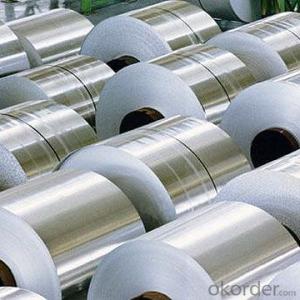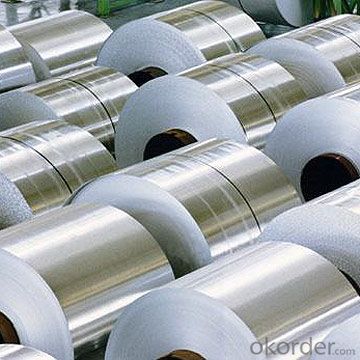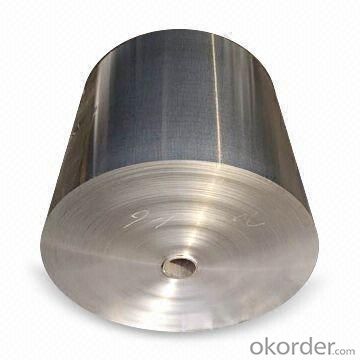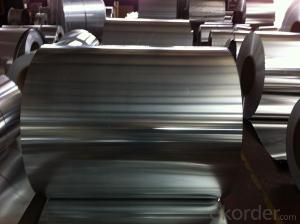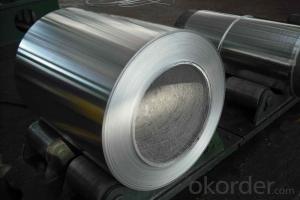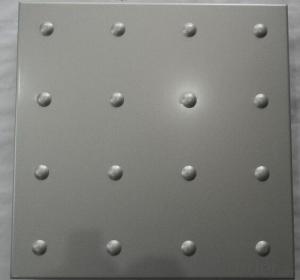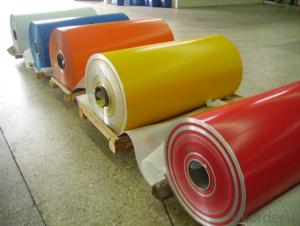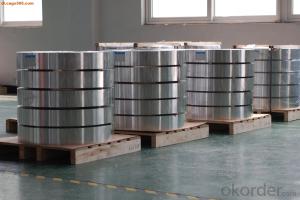Flat Wound Aluminum Coil Wire - EN AW-6061 Mill Finished Aluminum Coil with Best Quality
- Loading Port:
- Shanghai
- Payment Terms:
- TT OR LC
- Min Order Qty:
- 5 m.t.
- Supply Capability:
- 2000 m.t./month
OKorder Service Pledge
OKorder Financial Service
You Might Also Like
Specification
1. Structure of EN AW- 6061 Mill Finished Aluminium Coil With Best Quality Description
EN AW- 6061 Mill Finished Aluminium Coil With Best Quality is one semi-finished aluminium material. This coil can be rolled down to aluminium coil,sheet,circle ect. The alloy AA1050 is widly used in building, industry ect. Its weight is much lower than steel. So many customers choosed aluminium material instead of steel.
2. Specification of EN AW- 6061 Mill Finished Aluminium Coil With Best Quality
EN AW- 6061 Mill Finished Aluminium Coil With Best Quality | |
Main Specification | |
Alloy | AA1xxx (AA1050, AA1060, AA1070, AA1100 etc.) |
AA3xxx (AA3003, AA3004, AA3005, AA3105 etc.) | |
AA5xxx, AA6XXX (AA5052,AA5083, AA5754, AA6061, AA6062 etc.) | |
AA8xxx(AA8011, AA8006 etc.) | |
Temper | H14,H16, H18, H22, H24, H26, H32,O/F, T4, T6, T651 |
Thickmess | 0.01mm-100mm |
Width | 30mm-1700mm |
Standard | GB/T 3880-2006/ASTM |
Special specification is available on customer's requirement | |
3. Application of EN AW- 6061 Mill Finished Aluminium Coil With Best Quality
(1).Interior: wall cladding, ceilings, bathrooms, kitchens and balconies, shutters, doors...
(2).Exterior: wall cladding, facades, roofing, canopies, tunnels,column covers , renovations...
(3).Advertisement: display platforms, signboards, fascia, shop fronts...
4. Feature of EN AW- 6061 Mill Finished Aluminium Coil With Best Quality
Surfact Quality :
Be free from Oil Stain, Dent, Inclusion, Scratches, Stain, Oxide Dicoloration, Breaks, Corrosion, Roll Marks, Dirt Streaks and other defect which will interfere with use,
Mechenical Property:
Chemical Composite and Mechanical Property
5. Certificate of EN AW- 6061 Mill Finished Aluminium Coil With Best Quality
SGS and ROHS(if client request, paid by client), MTC(plant provided), Certificate of Origin(FORM A, FORM E, CO), Bureau Veritas and SGS (if client request, paid by client), CIQS certificate
6. Image of EN AW- 6061 Mill Finished Aluminium Coil With Best Quality
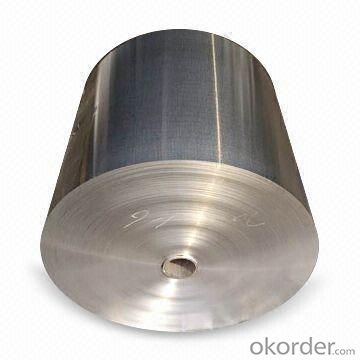
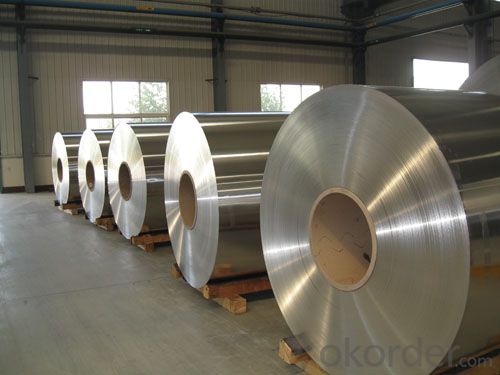
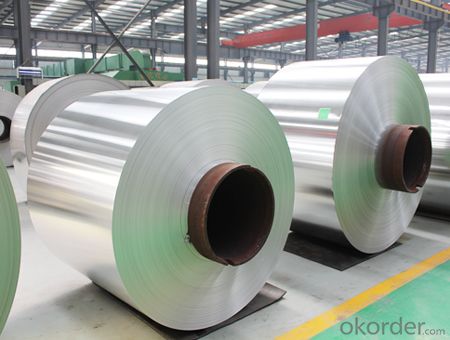
7. Package and shipping of EN AW- 6061 Mill Finished Aluminium Coil With Best Quality
First, plastic cloth with drying agent inside; Second, Pearl Wool ; Third, wooden cases with dry agent , fumigation wooden pallets, aluminum surface could cover blue PVC film
8. FAQ
1) What is the delivery time?
Depends on actual order, around 20 to 35 days
2) What is the QC system:
We have QC staff of 20 persons and advanced equipment, each production is with MTC traced from Aluminum ingot lot.
3) What market do you mainly sell to?
Australia, America, Asia, Middle East, Western Europe, Africa etc
- Q: What do the two items (COIL:873347 HEAT: number) on the label of the raw material of aluminum coil stand for?
- COIL means aluminum coil and HEAT means heating, so together they mean hot rolled coil.
- Q: Are there any specific regulations for the disposal of aluminum coil waste?
- Yes, there are specific regulations for the disposal of aluminum coil waste. The disposal of aluminum coil waste is subject to various environmental regulations to ensure proper handling and prevent any potential harm to the environment and human health. One of the key regulations is the Resource Conservation and Recovery Act (RCRA) in the United States. Under this act, aluminum coil waste is considered a hazardous waste if it exhibits certain characteristics such as ignitability, corrosivity, reactivity, or toxicity. If the waste meets these criteria, it must be managed as hazardous waste and disposed of in accordance with RCRA regulations. This may involve treatment, storage, and disposal at an approved hazardous waste facility. Additionally, the Environmental Protection Agency (EPA) has established guidelines for the disposal of non-hazardous aluminum coil waste. These guidelines typically require proper storage, labeling, and transportation of the waste to an authorized disposal facility. The disposal facility should be equipped to handle and process the waste in an environmentally responsible manner. In many countries, including the United States, local, state, and federal regulations may also apply to the disposal of aluminum coil waste. These regulations may vary depending on the specific location and the nature of the waste. It is crucial for businesses and individuals involved in the disposal of aluminum coil waste to familiarize themselves with the applicable regulations to ensure compliance and avoid potential penalties. Overall, it is important to follow the specific regulations for the disposal of aluminum coil waste to protect the environment, prevent pollution, and ensure the safety of individuals involved in waste management.
- Q: Can aluminum coils be used for packaging applications?
- Indeed, packaging applications can make use of aluminum coils. Aluminum, being a versatile material, possesses various advantageous properties for packaging purposes. Its lightweight nature, resistance to corrosion, non-toxicity, and exceptional thermal conductivity are just a few of the many benefits it offers. These qualities render aluminum coils perfect for packaging applications such as food and beverage containers, pharmaceutical packaging, and cosmetic packaging. Moreover, aluminum can easily be molded into various shapes and sizes, allowing for tailor-made packaging solutions. Its durability ensures the safeguarding of the packaged goods, while its ability to be recycled makes it an environmentally conscious choice. In summary, the versatility, performance, and sustainability of aluminum coils make them extensively utilized in packaging applications.
- Q: What is the weight of aluminum coils per square foot?
- The weight of aluminum coils per square foot can vary depending on the thickness and grade of the aluminum, but on average, aluminum coils typically weigh between 0.5 to 1.5 pounds per square foot.
- Q: What is the typical electrical resistivity of aluminum coils?
- Aluminum coils have an average electrical resistivity of around 2.65 x 10^-8 ohm-meters, showcasing their exceptional conductivity. This attribute renders them a top-notch option for electrical conductors. The remarkable conductivity enables an efficient flow of electric current within the coils, thereby reducing energy dissipation and heat production. Consequently, aluminum coils find extensive utilization in diverse electrical sectors, including transformers, motors, and generators.
- Q: Are aluminum coils fire-resistant?
- Yes, aluminum coils are fire-resistant. Aluminum has a high melting point of 660 degrees Celsius (1220 degrees Fahrenheit) and it does not burn, making it a non-combustible material. This property makes aluminum coils suitable for various applications where fire resistance is a critical factor, such as in building construction, electrical wiring, and HVAC systems. Additionally, aluminum's excellent heat conductivity helps dissipate heat quickly, reducing the risk of fire. However, it is important to note that while aluminum coils themselves are fire-resistant, they may be used in systems that include other components which may not have the same level of fire resistance. It is important to consider the entire system and follow proper fire safety regulations and guidelines to ensure overall fire safety.
- Q: Is it possible to customize the dimensions of aluminum coils?
- Indeed, the dimensions of aluminum coils can be tailored to suit individual preferences. Customers are able to request and obtain aluminum coils that have been manufactured and trimmed to specific measurements in accordance with their particular requirements and specifications. This customization procedure entails the meticulous cutting and molding of the aluminum coil in order to achieve the desired dimensions. This capability offers versatility across a range of industries and applications, where precise coil sizes are indispensable. By customizing the dimensions of aluminum coils, they become perfectly compatible with various production procedures, machinery, or end-use applications.
- Q: When you open an aluminum beverage can, do particles of aluminum get into the drink?
- Most aluminum cans these days have a thin polymer coating inside that keeps the aluminum from being exposed to the (usually acidic) soft drinks. Aluminum also inevitably has a thin unreactive oxide layer on its surface. (This can be attacked by liquids, but they must be very acidic.) The only exposed aluminum surface when you open the can is around the hole created by the pull-tab. That has a very low surface area and is quickly coated with the unreactive oxide too. Aluminum content in the drink is consequently very low.
- Q: Can aluminum coils be used in the production of railway tracks?
- No, aluminum coils cannot be used in the production of railway tracks. Railway tracks are typically made of steel for several reasons. Steel is a strong and durable material that can withstand the heavy loads and constant wear and tear of train traffic. It also has good heat resistance and can maintain its structural integrity under high temperatures, which is important for tracks that are exposed to friction and heat generated by moving trains. Aluminum, on the other hand, is a lighter metal with lower strength and poorer heat resistance compared to steel. While aluminum may be used in other components of railway infrastructure, such as electrical wires or certain parts of trains, it is not suitable for the production of railway tracks themselves.
- Q: Is there aluminum coil of 44mm wide and 0.40mm thick?
- The common width of aluminum coil is 1000mm or 1220mm. If you want 0.4mm*1000MM aluminum coil, you can strip 0.4mm*1000MM aluminum coil.
Send your message to us
Flat Wound Aluminum Coil Wire - EN AW-6061 Mill Finished Aluminum Coil with Best Quality
- Loading Port:
- Shanghai
- Payment Terms:
- TT OR LC
- Min Order Qty:
- 5 m.t.
- Supply Capability:
- 2000 m.t./month
OKorder Service Pledge
OKorder Financial Service
Similar products
Hot products
Hot Searches
Related keywords
